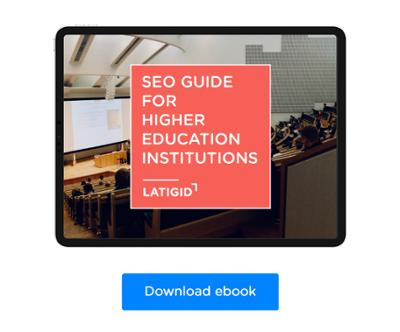
Higher education SEO plays a pivotal role in attracting prospective students, faculty, and stakeholders. Search engine optimization (SEO) has become an indispensable tool in ensuring that your university or college's website ranks prominently in search engine results. Whether you're an admissions officer, a marketing professional, or a web developer in the higher education sector, understanding the intricacies of SEO is essential for driving organic traffic to your website. In this article, we'll explore five invaluable higher education SEO tips that will not only enhance your website's visibility but also help you connect with the right audience.
What is higher education SEO?
Higher education SEO, or search engine optimization, refers to the strategies and techniques used by colleges, universities, and other institutions of higher learning to improve their online visibility and organic search rankings in search engines like Google, Bing, and Yahoo. The goal of higher education SEO is to attract more prospective students, engage with current students and faculty, and enhance the overall online presence of the institution.
Related article: From Local to Global: Expanding your University's Reach through SEO
Why is SEO important for higher education institutions?
SEO is important for higher education institutions (HEIs) for several reasons:
SEO helps improve your institution's visibility : SEO helps HEIs improve their online visibility, making it easier for prospective students, parents, and other stakeholders to find information about the institution. When people search for terms related to higher education, SEO can ensure that your institution's website appears prominently in search engine results pages (SERPs).
Can give your institution a competitive edge : Many HEIs are vying for the attention of the same target audience. Effective SEO strategies can give your institution a competitive edge by ensuring that it ranks higher than competitors in search results, attracting more organic traffic.
SEO can be a cost-effective marketing strategy: SEO can be a cost-effective marketing strategy compared to traditional advertising methods. By optimizing your website for search engines, you can attract organic traffic without the ongoing costs associated with paid advertising.
SEO allows institutions to attract highly targeted traffic: SEO allows HEIs to attract highly targeted traffic. By optimizing for specific keywords related to your programs, courses, and offerings, you can connect with individuals who are actively searching for the educational services you provide.
improves user experience: Good SEO practices often involve optimizing the user experience on your website. This can include improving site navigation, ensuring fast page loading times, and making your content more accessible. A better user experience not only pleases visitors but can also positively impact your search rankings.
increases the institution's credibility and reputation: Websites that appear at the top of search results are often perceived as more credible and trustworthy by users. By ranking well in search engines, HEIs can build trust with prospective students and stakeholders.
SEO can help higher education institutions reach a global audience: SEO can help HEIs reach a global audience. With effective optimization, your institution can attract international students and expand its reach beyond your immediate geographic location.
Related article: Higher Education SEO: On-Page Optimization Guide
5 higher education SEO tips to boost your traffic
Boosting traffic to a higher education institution's website through SEO requires a strategic approach. Here are five SEO tips to help increase your website's visibility and attract more visitors:
Keyword research and optimization
- Conduct thorough keyword research to identify the terms and phrases prospective students and stakeholders are using when searching for higher education information.
- Optimize your website's content, including landing pages, blog posts, and program descriptions, with relevant keywords. Use these keywords naturally and avoid keyword stuffing.
- Consider long-tail keywords and localized keywords to target specific niches and regions.
Content creation and blogging
- Create high-quality, informative, and engaging content that addresses the questions and needs of your target audience. This can include articles, guides, videos, and infographics.
- Maintain a blog that covers topics related to higher education, academic programs, student life, and career guidance. Consistent blogging can help you rank a variety of keywords and attract organic traffic.
- Ensure that your content is well-structured, easy to read, and mobile-friendly.
On-page SEO optimization
- Optimize on-page elements such as titles, headings (H1, H2, H3, etc.), meta descriptions, and URLs. Include your target keywords in these elements.
- Use descriptive and compelling titles and meta descriptions to improve click-through rates from search engine results pages.
- Improve the loading speed of your website by optimizing images, using efficient coding, and leveraging browser caching.
Mobile optimization
- Ensure that your website is mobile-friendly and responsive. Google considers mobile friendliness when ranking websites, and many users access websites on mobile devices.
- Test your website's mobile performance using Google's Mobile-Friendly Test and make necessary improvements.
Local SEO for campus locations
- If your institution has multiple campuses or locations, optimize your website for local SEO. Create dedicated pages for each campus with location-specific information, contact details, and maps.
- Claim and optimize your Google My Business listings for each campus to improve local search visibility.
- Encourage student reviews and ratings on Google and other review platforms.
Bonus tip: Backlink building and outreach
- Develop a backlink-building strategy to acquire high-quality, relevant backlinks from authoritative websites in the education niche.
- Reach out to industry influencers, bloggers, and educational organizations for guest posting opportunities and collaborations. High-quality backlinks can boost your site's authority and search rankings.
Remember that SEO is an ongoing effort. Regularly monitor your website's performance using tools like Google Analytics and Google Search Console and be prepared to adjust your strategy based on the data and evolving SEO trends. Consistency and persistence are key to achieving long-term success with SEO for higher education institutions.
Related article: Why Higher Education Institutions Need an SEO Agency to Grow
About Latigid
We are a higher education SEO agency. We help you grow by increasing website traffic, generating more student leads, and closing those leads into enrollment. With a deep understanding of the latest industry trends and best practices, we are well equipped to help your institution grow.
If you are looking for a higher education SEO agency to partner with, check our page to see what we can do for you!
Download our SEO guide and learn how to build a strategy to optimize your Higher Education Institution's website







